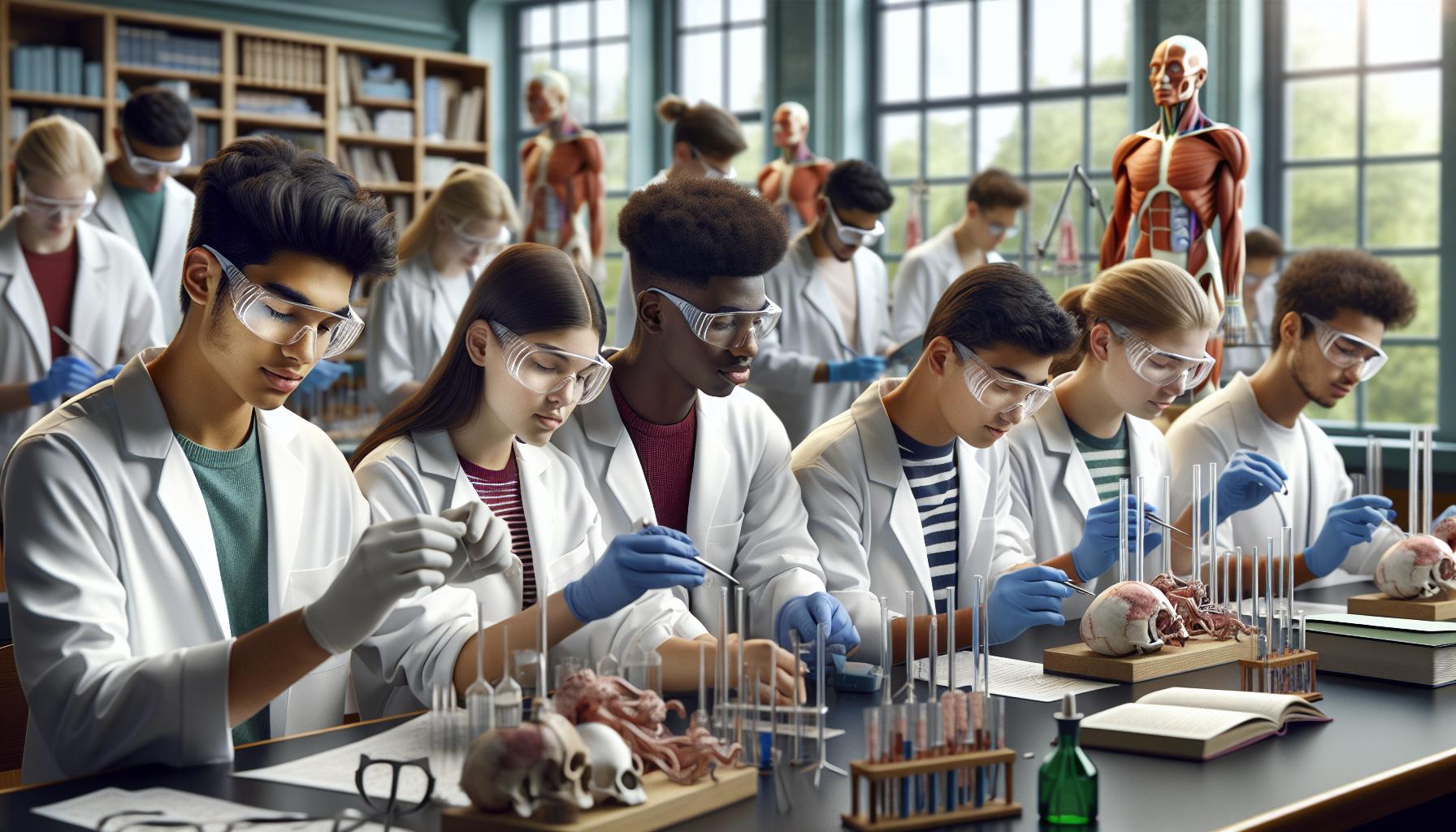The fascinating world of forensic science offers unique career opportunities for those interested in both medical science and criminal justice. Becoming an autopsy technician, also known as a forensic technician or diener, combines technical expertise with investigative work to help determine causes of death and assist in criminal investigations. For individuals with a strong stomach and keen attention to detail, working as an autopsy tech provides a rewarding career path that serves an essential role in the medical and legal system. These professionals work alongside forensic pathologists in morgues and medical examiner offices, helping to uncover vital evidence and document findings that bring closure to families and justice to victims.
How to Become an Autopsy Tech
An autopsy technician assists forensic pathologists in conducting postmortem examinations to determine causes of death. These skilled professionals work in morgues, medical examiner offices, hospitals or forensic laboratories, performing essential tasks in death investigations.
Key Responsibilities and Duties
Autopsy technicians perform specific technical tasks in the examination process:
- Prepare examination rooms with required instruments, equipment, and supplies
- Clean and sterilize surgical tools, equipment, and work areas
- Take body measurements and document physical characteristics
- Collect tissue, fluid, and blood samples for laboratory testing
- Photograph evidence and document findings
- Transport bodies between storage facilities and examination rooms
- Assist pathologists during autopsies by handling instruments and specimens
- Maintain detailed records of examinations and chain of custody
- Process death certificates and release paperwork
Work Environment and Schedule
The work environment of autopsy technicians involves specific conditions and requirements:
- Location: Medical examiner offices, hospital morgues, forensic laboratories
- Hours: 40-hour workweeks with on-call rotations
- Physical demands: Standing for extended periods, lifting up to 100 pounds
- Safety protocols: Personal protective equipment usage, exposure to biohazardous materials
- Temperature: Climate-controlled environments at 55-65°F
- Lighting: Bright surgical lighting systems
- Team interaction: Regular collaboration with pathologists, investigators, law enforcement
| Shift Type | Hours | Frequency |
|---|---|---|
| Day Shift | 8am-4pm | Standard |
| Evening Shift | 4pm-12am | As needed |
| Weekend Coverage | 8am-4pm | Rotating |
| On-call Hours | 24-hour periods | 1-2 times monthly |
Educational Requirements

Becoming an autopsy technician requires specific educational qualifications that combine medical knowledge with technical skills. The educational path starts in high school and progresses through post-secondary education.
High School Prerequisites
High school students interested in becoming autopsy technicians benefit from focusing on science-based courses. Key courses include:
- Biology classes with lab components
- Chemistry courses with hands-on experiments
- Anatomy & physiology electives
- Mathematics through algebra II
- Computer science fundamentals
- Health sciences courses
College Degree Options
Aspiring autopsy technicians must complete a formal education program to qualify for professional positions. Educational paths include:
- Associate degree in Mortuary Science
- Bachelor’s degree in Forensic Science
- Bachelor’s degree in Biology
- Certificate programs in Pathology Technology
Each program includes essential coursework:
- Human anatomy
- Microbiology
- Forensic photography
- Medical terminology
- Laboratory procedures
- Pathology basics
- 60-120 credit hours (depending on degree type)
- Laboratory experience
- Clinical rotations
- Safety protocol training
- Professional certification preparation
| Degree Type | Duration | Credit Hours | Clinical Hours |
|---|---|---|---|
| Certificate | 12 months | 30-45 | 100-200 |
| Associate | 2 years | 60-70 | 200-400 |
| Bachelor’s | 4 years | 120-130 | 400-600 |
Required Training and Certification
Autopsy technicians complete specialized training programs and obtain certifications to demonstrate their expertise in forensic procedures. The combination of formal education and practical experience prepares technicians for the demands of forensic laboratory work.
Certification Programs
The American Board of Medicolegal Death Investigators (ABMDI) offers two levels of certification for autopsy technicians:
- Registry Certification (ABMDI-R): Entry-level certification requiring 640 hours of death investigation experience
- Board Certification (ABMDI-D): Advanced certification requiring 4,000 hours of experience plus Registry certification
Additional certifications include:
- Certified Forensic Autopsy Technician (CFAT) through the American Society for Clinical Pathology
- Forensic Autopsy Specialist (FAS) certification from the National Association of Medical Examiners
- State-specific licensure requirements in select jurisdictions
Hands-On Training Requirements
Practical training components include:
- 12-24 months of supervised morgue experience
- 200 hours of clinical rotations in pathology departments
- 50 documented postmortem examinations
- Training in:
- Surgical instrument handling
- Evidence collection procedures
- Photography techniques
- Body transportation protocols
- Safety measures for infectious disease control
- Documentation methods
- Chain of custody procedures
- Hospital morgues
- Medical examiner offices
- Forensic laboratories
- Teaching hospitals with pathology programs
| Training Component | Duration/Requirement |
|---|---|
| Supervised Experience | 12-24 months |
| Clinical Rotations | 200 hours |
| Postmortem Examinations | 50 cases |
| Registry Certification Experience | 640 hours |
| Board Certification Experience | 4,000 hours |
Essential Skills and Qualities
Autopsy technicians require a specific combination of technical expertise and personal characteristics to perform their duties effectively. The role demands precision, attention to detail and the ability to work in challenging environments.
Technical Skills
- Mastery of surgical instruments including scalpels, forceps and bone saws
- Proficiency in laboratory techniques for specimen collection and preservation
- Advanced knowledge of human anatomy and medical terminology
- Expertise in forensic photography and documentation methods
- Competence in digital record-keeping systems and database management
- Understanding of safety protocols and infection control procedures
- Ability to operate specialized equipment like scale systems and measuring devices
- Skills in evidence collection and maintaining chain of custody
- Strong emotional stability to handle traumatic situations
- Physical stamina for lifting, moving and standing for extended periods
- Exceptional attention to detail when examining and documenting findings
- Clear communication skills for interacting with pathologists and law enforcement
- Ability to maintain professional composure in challenging environments
- Strong organizational skills for managing multiple cases simultaneously
- Critical thinking abilities for problem-solving during examinations
- Reliability and punctuality for on-call scheduling demands
- Respect for confidentiality and ethical guidelines
Career Path and Advancement
The career path for autopsy technicians offers multiple advancement opportunities within forensic science and pathology. Professional growth depends on experience, additional certifications, and specialized training.
Entry-Level Positions
Entry-level autopsy technicians begin as morgue assistants or junior technicians in medical examiner offices or hospital morgues. Common responsibilities include:
- Assisting senior technicians with basic procedures
- Maintaining morgue equipment and supplies
- Processing paperwork and documentation
- Handling specimen collection under supervision
- Supporting forensic pathologists during routine autopsies
Starting salaries range from $35,000 to $45,000 annually, varying by location and facility type:
| Position Type | Annual Salary Range | Required Experience |
|---|---|---|
| Morgue Assistant | $35,000 – $40,000 | 0-1 years |
| Junior Technician | $40,000 – $45,000 | 1-2 years |
| Hospital Morgue Tech | $38,000 – $43,000 | 0-2 years |
Growth Opportunities
Experienced autopsy technicians advance through several career paths:
- Lead Autopsy Technician: Supervising junior staff and managing morgue operations
- Forensic Specialist: Focusing on complex cases and criminal investigations
- Laboratory Supervisor: Overseeing forensic testing facilities
- Education/Training: Teaching at technical schools or certification programs
Advanced positions offer increased compensation:
| Position Level | Annual Salary Range | Required Experience |
|---|---|---|
| Lead Technician | $50,000 – $60,000 | 5+ years |
| Forensic Specialist | $55,000 – $65,000 | 7+ years |
| Laboratory Supervisor | $60,000 – $75,000 | 8+ years |
| Training Coordinator | $58,000 – $70,000 | 6+ years |
- Advanced certifications (ABMDI-D, FAS)
- Specialized training in forensic techniques
- Leadership experience
- Research contributions
- Continuing education credits
Salary and Job Outlook
Autopsy technicians earn competitive salaries based on their experience, certifications and location. The compensation varies across different institutions and geographical regions, while industry demand continues to grow with advancements in forensic science.
Average Compensation
The median annual salary for autopsy technicians ranges from $45,000 to $65,000. Entry-level positions start at $35,000, while experienced technicians earn up to $75,000 annually. Location significantly impacts earnings:
| Region Type | Salary Range |
|---|---|
| Urban Areas | $55,000 – $75,000 |
| Suburban Areas | $45,000 – $65,000 |
| Rural Areas | $35,000 – $55,000 |
Additional certifications increase earning potential by 10-15%. Benefits packages typically include health insurance, retirement plans and paid time off.
Industry Demand
The employment outlook for autopsy technicians shows a projected growth rate of 11% through 2030. Key factors driving demand include:
- Increased focus on forensic investigations in criminal cases
- Growing need for medical research support
- Expanding healthcare facilities requiring morgue services
- Rising demand in teaching hospitals for educational purposes
Employment opportunities exist in:
- Medical examiner offices
- Hospital morgues
- Research institutions
- Government agencies
- Private forensic laboratories
Metropolitan areas offer 3x more job openings compared to rural locations. States with the highest employment rates include California, Texas, Florida, New York and Illinois. Becoming an autopsy technician offers a unique career path for those passionate about forensic science and medical investigation. The combination of education requirements certifications and hands-on experience creates well-rounded professionals ready to contribute to criminal justice and medical research. While the path requires dedication and specific personality traits the career rewards include competitive salaries stable job prospects and opportunities for advancement. Those interested in pursuing this challenging yet rewarding field should carefully evaluate their commitment to the necessary education training and emotional resilience required for success. For the right individual an autopsy technician career provides not just a stable profession but also the chance to make meaningful contributions to justice medical advancement and public service.



